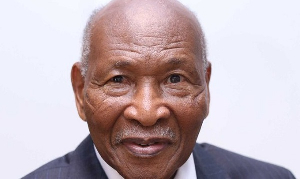Opinions of Tuesday, 26 December 2023
Columnist: Appodey Isaac
Revitalising Democracy: Understanding low turnout in district assembly elections in Berekum East constituency
Participation in local governance is a cornerstone of a thriving democracy, and district assembly elections play a crucial role in shaping the trajectory of communities.
However, in Berekum East Constituency, there has been a concerning trend of low voter turnout in recent district assembly elections and this article aims to explore the reasons behind this phenomenon.
It will also analyse its implications on national development, and propose potential solutions to rekindle civic engagement in the region.
Reason for the low turnout
Lack of Civic Education: One of the primary reasons for low turnout in district assembly elections is the inadequate level of civic education. Many residents may not have fully grasp the importance of these elections in local governance and their direct impact on community development.
Civic Apathy and Disillusionment: A prevailing sense of civic apathy and disillusionment with the political process can contribute to low voter turnout. Citizens feel detached from the impact of their votes on local governance, leading to a lack of motivation to participate.
Economic Challenges: Economic hardships facing communities in Berekum East diverts citizens' attention from electoral participation. Meeting daily needs often takes precedence over civic responsibilities, especially when financial stability is uncertain.
Perceived Ineffectiveness of Local Governance: A perception that district assemblies are ineffective in addressing local issues can dissuade citizens from voting. Scepticism about the impact of their votes on tangible improvements to community life can contribute to voter apathy.
Implications of the low turnout in district assembly elections on national development has far-reaching implications for national development.
Ineffective Local Governance: A lack of active participation hampers the effectiveness of local governance structures. Elected officials may lack the legitimacy and mandate needed to address community concerns adequately.
Underrepresentation: Low turnout can result in the underrepresentation of diverse voices in decision-making processes. This lack of diversity can hinder the development of inclusive and comprehensive policies that address the needs of all community members.
Stalled Grassroots Development: With low voter participation, elected officials may lack the necessary mandate to drive impactful grassroots development projects. This can result in a stagnation of initiatives that address the specific needs of the community.
Erosion of Local Democracy: Low turnout threatens the very essence of local democracy, where citizen engagement is the bedrock. This erosion weakens the democratic fabric of the nation, compromising the legitimacy of elected representatives.
Suggested Solutions
Intensive Civic Education: Launching comprehensive civic education campaigns to inform residents about the importance of district assembly elections, the role of local governance, and how it directly affects their daily lives.
Enhanced Transparency and Accountability: District assemblies should prioritise transparency and accountability in their operations. Establishing mechanisms for clear communication about ongoing projects, budget allocations, and their impact on the community can build trust and encourage participation.
Economic Empowerment Programs: Implementing economic empowerment programs at the local level to alleviate economic pressures on citizens. When basic needs are met, individuals are more likely to engage in civic activities.
Community Dialogues: Facilitating open forums and community dialogues where residents can express their concerns, provide input on development projects, and interact with elected officials can foster a sense of community and civic responsibility.
Legal Reforms:Reviewing and updating electoral laws and regulations to address any barriers or shortcomings that may hinder participation. This includes ensuring that voting procedures are straightforward, accessible, and inclusive, allowing all eligible citizens to exercise their right to vote without unnecessary obstacles.
Media Engagement: Collaborating with local media outlets to disseminate information about district assembly elections and candidates. Engaging in public debates, interviews, and community-focused content can raise awareness and generate interest among the populace.
Conclusion
Boosting participation in district assembly elections in Berekum East Constituency is essential for fostering a robust local democracy and driving national development. Through a combination of civic education, increased transparency, economic empowerment, and community engagement, it is possible to rekindle the spirit of active citizenship and ensure that every voice is heard in the democratic process. As citizens actively participate in shaping the future of their communities, the positive ripple effects will undoubtedly contribute to the overall development of the nation.













